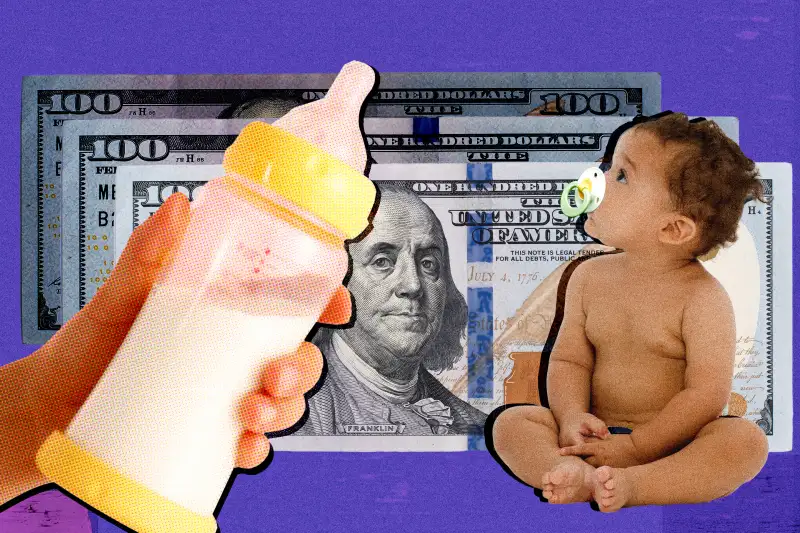How a New ‘Baby Bonds’ Proposal to Give Every Child $1,000 at Birth Would Work

Some lawmakers want to give a $1,000 gift to every family that welcomes a baby.
A proposal that would give every American child $1,000 at birth — plus additional yearly payments for lower-income families — is once again gaining attention after progressive lawmakers recently reintroduced a bill in the House of Representatives and the Senate.
How 'baby bonds' would work
The proposal is commonly referred to as “baby bonds,” though the legislation is officially titled the American Opportunity Accounts Act. The act was introduced into the House and Senate last week by Rep. Ayanna Pressley, D-Mass and Sen. Cory Booker, D-N.J.
- The American Opportunity Accounts Act would provide $1,000 to every American child at birth in a federally-funded, interest-bearing savings account.
- Each year, families would receive an additional deposit into the account depending on their income. High-income earners would receive no additional deposit while families that earn below the poverty line would receive $2,000 per year.
- Under the proposal, a child growing up in a household below the poverty line would have an estimated account balance of $46,215 by 18.
- At 18, the account holder could use the funds for certain wealth-building activities like buying a home, paying for college, starting a business or saving for retirement. There are no restrictions on the funds once the recipient turns 59.5 years old.
“Baby Bonds are one of the most effective tools we have for closing the racial wealth gap and breaking the cycles of poverty and trauma that have prevented Black and brown folks from thriving in this country,” Rep. Pressley said in an announcement of the proposal, “so it is no surprise that this idea has gained traction in states across the country.”
Sen. Booker first introduced the proposal in 2018, then again with Rep. Pressley in 2021, kickstarting a wave of interest at a state and local level.
- According to the left-leaning nonprofit Urban Institute, Connecticut, Washington, D.C. and California currently have similar policies in effect, but they aren't universally available. In D.C., for example, the local government provides a $500 baby bond account at birth to low-income families plus an annual deposit of up to $1,000 to families who remain within 300% of the poverty line.
- Additionally, state lawmakers have introduced baby bond legislation in Delaware, Iowa, New Jersey, New York, Washington, Nevada, Wisconsin and Massachusetts.
What the research says
The American Opportunity Accounts Act is aimed at reducing the racial wealth gap, though the initial $1,000 would be universal and the supplemental deposits each year would based on income levels — not race.
- While the racial wealth divide has shrunk considerably since the abolishment of slavery nearly 160 years ago, a wide gap persists, according to the Federal Reserve Bank of Minneapolis.
- In 1870, the wealth gap between Black and White Americans was 23 to 1, the Minneapolis Fed says. By 2019, the gap has narrowed to 6 to 1.
- In other words, the average wealth of white Americans in 2019 was $338,093 while the average wealth for Black Americans was $60,126.
While every child would qualify for an initial $1,000 at birth, the baby bond program would address the racial wealth gap by providing supplemental payments each year to financially needy families, up to $2,000.
“Because of the racialized nature of wealth distribution in the US, targeting resources toward children from households with the least resources disproportionately benefits children from Black, Latinx and Indigenous households,” according to a report by Shira Markoff, a policy fellow at the pro-baby bond advocacy group Prosperity Now.
- Estimates from the offices of Rep. Pressley and Sen. Booker suggest their proposal would, on average, benefit Black and Latinx children more than white children.
- By the age of 18, the average account for a Black child would accrue $29,800, a Latinx child would accrue $22,300, and a white child would accrue $11,690.
Democrats in favor of the baby bond accounts also say the program would pay for itself “by making common sense reforms to federal estate and inheritance taxes, including restoring the estate tax to 2009 levels.”
That claim is buttressed by a budget analysis from the fiscally conservative Committee for a Responsible Federal Budget (CRFB).
- Shortly after the proposal was first introduced, the CRFB found in 2019 that the program would cost $650 billion over a decade.
- By increasing the tax rate on capital gains and dividends to 28% as well as increasing estate taxes, the plan would raise $700 billion in tax revenue over 10 years to more than offset its cost.
Keep in mind
The American Opportunity Accounts Act would be a massive overhaul of our tax and social safety net programs, and the proposal is not likely to become law during this Congressional session due to a Republican majority in the House of Representatives.
Some Republican representatives do want major tax reform. However, they're far apart on the minutiae. Take the recently proposed Fair Tax Act. The proposal aims to abolish the IRS entirely, get rid of all current federal taxes and establish an estimated 30% nationwide sales tax — a move that the left-leaning Brookings Institution expects would increase the tax burden on the bottom 90% of earners.
More from Money:
Used Car Prices Are Down for the Fourth Straight Month — but Costs May Soon Rise Again

